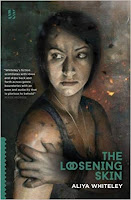One benefit of the Arthur C Clarke Award for best science-fiction novel of the year moving from April to July is that when the Dr asked what I might like for my birthday, I could direct her to the shortlist. The result, via my generous in-laws, was three of the six titles: Semiosis by Sue Burke, Frankenstein in Baghdad by Ahmed Saadawi and The Loosening Skin by Aliya Whiteley. (The other three are Revenant Gun by Yoon Ha Lee, The Electric State by Simon Stålenhag and Rosewater by Tade Thompson.)
Of these, I've only read work by Whiteley before. The Beauty (2014) is about a world without women and reads like walking through a nightmare, not least because the narrator is so passive. The Arrival of Missives (2016) is a similarly haunting tale, this time set in a village in the shadow of the First World War. Whiteley is brilliant at taking an outlandish, unsettling idea and playing it utterly credibly.
The Loosening Skin is set in the present day but in a world where humans moult. When, every seven years or so, they shed their skin, they also shed its associated love. At the start of the book, Rose is in a loving, tender relationship with a movie star she's also working for as a bodyguard. Then she sheds her skin and can no longer bear to be in the same room with him. But he's used to having whatever he wants and won't accept that.
As we follow this story, we explore the consequences of moulting. It doesn't just affect lovers - who know from their first kiss that they are doomed. When children moult, they no longer love their parents. This world is full of broken people, struggling with attachment, learning not to love so as to preserve something. Brilliantly, we're told humans have always been like this - which has a huge impact on history and culture. There can be no Miss Haversham in this reality, there can be no Last Tango in Halifax.
There's more than the moulting itself. There's a whole culture around the shed skins - displays of celebrity skins in the British Museum, an underground of illegal sales. Then there's the chance that there might be a cure, a way of preventing the moult - but, of course, at a terrible cost.
I got utterly caught up in this richly drawn, horrible world. It's such a disturbing idea and yet it feels so real. At one point, Rose talks us through her moults in turn, each one devastating. That tale-telling is itself part of a truly horrific episode that haunts the rest of the book. I found the novel haunting, and couldn't get it out of my head, but it's not the horrific moments that got me so much as the simple, everyday consequences that result from this one strange idea. There could easily be more stories set in the same world. I hope there are.
Of these, I've only read work by Whiteley before. The Beauty (2014) is about a world without women and reads like walking through a nightmare, not least because the narrator is so passive. The Arrival of Missives (2016) is a similarly haunting tale, this time set in a village in the shadow of the First World War. Whiteley is brilliant at taking an outlandish, unsettling idea and playing it utterly credibly.
The Loosening Skin is set in the present day but in a world where humans moult. When, every seven years or so, they shed their skin, they also shed its associated love. At the start of the book, Rose is in a loving, tender relationship with a movie star she's also working for as a bodyguard. Then she sheds her skin and can no longer bear to be in the same room with him. But he's used to having whatever he wants and won't accept that.
As we follow this story, we explore the consequences of moulting. It doesn't just affect lovers - who know from their first kiss that they are doomed. When children moult, they no longer love their parents. This world is full of broken people, struggling with attachment, learning not to love so as to preserve something. Brilliantly, we're told humans have always been like this - which has a huge impact on history and culture. There can be no Miss Haversham in this reality, there can be no Last Tango in Halifax.
There's more than the moulting itself. There's a whole culture around the shed skins - displays of celebrity skins in the British Museum, an underground of illegal sales. Then there's the chance that there might be a cure, a way of preventing the moult - but, of course, at a terrible cost.
I got utterly caught up in this richly drawn, horrible world. It's such a disturbing idea and yet it feels so real. At one point, Rose talks us through her moults in turn, each one devastating. That tale-telling is itself part of a truly horrific episode that haunts the rest of the book. I found the novel haunting, and couldn't get it out of my head, but it's not the horrific moments that got me so much as the simple, everyday consequences that result from this one strange idea. There could easily be more stories set in the same world. I hope there are.



































